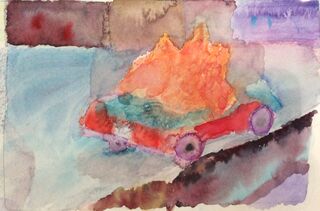
During the last four months, we have experienced change across every element of our lives. Much of this has to do with how we earn a living and our relations to the communities of which we are a part, but deeper shifts are also occurring in how we understand time, culture, and technology. In this post, I discuss how imagination has been affected during the pandemic as a consequence of the loss of a sense of control.
Existentialist philosophers, many who lived and wrote through the Second World War, can teach us about dealing with adversity. They affirmed a form of coping wherein one should maintain a sense of the ethical import of her life by seeking to achieve authenticity in action, intention, and thought. They reasoned that since most things are out of our control, and since the categories of meaning derived from religion and ancient philosophy no longer apply to us, we must devise a way to affirm our experiences, i.e., our phenomenological states themselves. The projects we undertake in the world are precisely what constitute who and what we are since existence is intrinsically tied to meaning, to what we make of our lives, to how we exist in time.
Imagine that all your projects in the world come to an abrupt halt and that your plans, the way you structure meaning into the future, are cut off. It isn’t hard to do: Many of us experienced this sudden cessation of being in the world; it felt like alienation. It is not that we stopped living with the onset of the pandemic, but that our previous forms of engagement with the world were no longer available, and we had to adopt new ways of living.
In the wake of the disruption, we struggled to maintain structure and secure our basic needs: food, shelter, sleep, health, resources, property, friendship, intimacy. Higher needs, like self-esteem, freedom, strength, and status, required more work and ingenuity. We learned that Abraham Maslow’s most rarefied form of need—for self-actualization, growth, and creativity—required engaging in projects in the world from which we felt largely cut off.
How does one pursue a good life (eudaimonia) in the midst of fear, anxiety, and uncertainty? The recent crisis has furthermore revealed the extent of the precarity that plagues us, that so many in the richest country in the world consider these pressures a normal feature of their lives. According to the existentialists, anxiety occurs when we lose those things we take for granted, when the way we lived is exposed as absurd.
Alienation follows at the heels of the sense of the absurd when many of us realize that what was "normal" just a few months ago is a deeply flawed experiment in society, economy, and politics. While many have made of the space, the freedom, opened up by the crisis and its ramifications an opportunity to demonstrate a will and a need to make changes to the systems by which we are governed, others can’t wait to get back to "normal." Is seeking stability, even if the stable structure is inherently problematic, a form of freedom, or an example of acting in "bad faith"?
We have been called upon to draw from our imaginative resources during this crisis. A reliance upon cultural products, like movies, books, television, and social media, helped salve the curtailment of our public lives and shared spaces. Cultural products give us a way to direct the imagination; technology provides the vessels into which we pour time, attention, and imagination. At the same time, we are being furnished with tools to imagine the future, to conceive of the dark days to come and hopeful scenarios of salvation.
We looked to technology to provide us with a way of understanding what was going on and what we can do. And how to gain a living, as well as maintain contact with each other. And sometimes just as a way to while away the time and dull the anxiety.
At times, imagination dried up, and boredom and apathy consumed us. Rather than creatively build the world every morning by commuting, talking, attending, working, eating, pursuing, we watched the world that we imagined. We watched the science-fiction of another place, the dystopic visions, and indulged in the distractions of humor. Above all, we watched the news and followed with disbelief the dissolution of the world we imagined into being.
Imagination is the key: It is the way we interpret ourselves in the world, and it is the way we conceptualize the future. How do we imaginatively assess the function of our own lives in the historical context of our relations to others, to the society we co-create? Like the existentialists, we are driven to consider the customs, forms, and institutions by which we relate to each other, and within which our lives take shape—in short, we must engage with politics. What is it to live in this country right now? What are the "normal" forms of freedom that we consider worth returning to?
What is normal? It is how we imagine ourselves moving through time in the ways that provide the best sense of safety, security, freedom, and fulfillment. This is not to say we all imagine the same future, nor even that we all imagine the same past. For better or worse, the collaborative creation of our world and what it will become is a sometimes confrontational and sometimes harmonious negotiation between visions. May we enrich our imaginations with healthy ideas for the days to come.
References
Crowell, Steven, "Existentialism", The Stanford Encyclopedia of Philosophy (Summer 2020 Edition), Edward N. Zalta (ed.), URL = <https://plato.stanford.edu/archives/sum2020/entries/existentialism/>.




